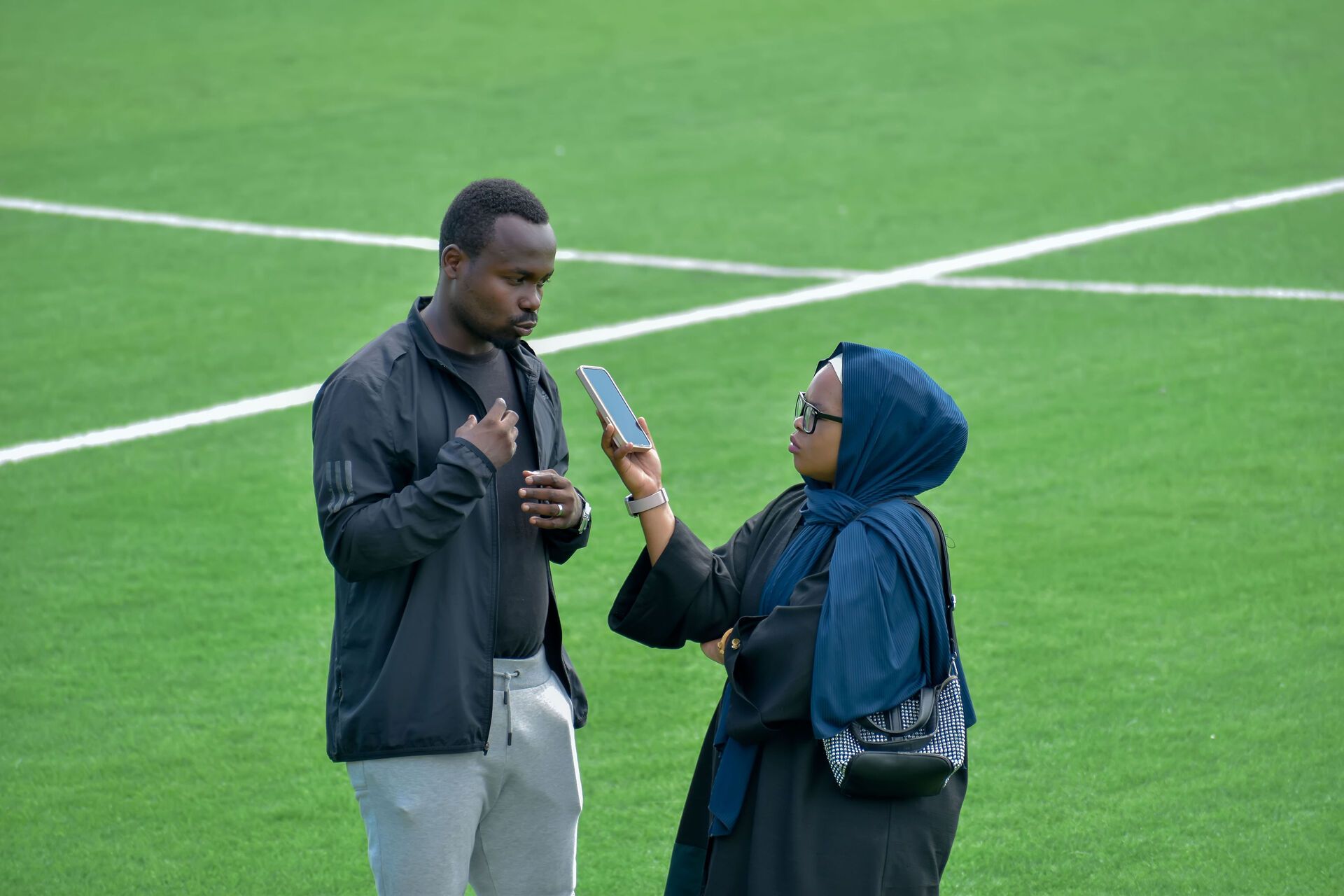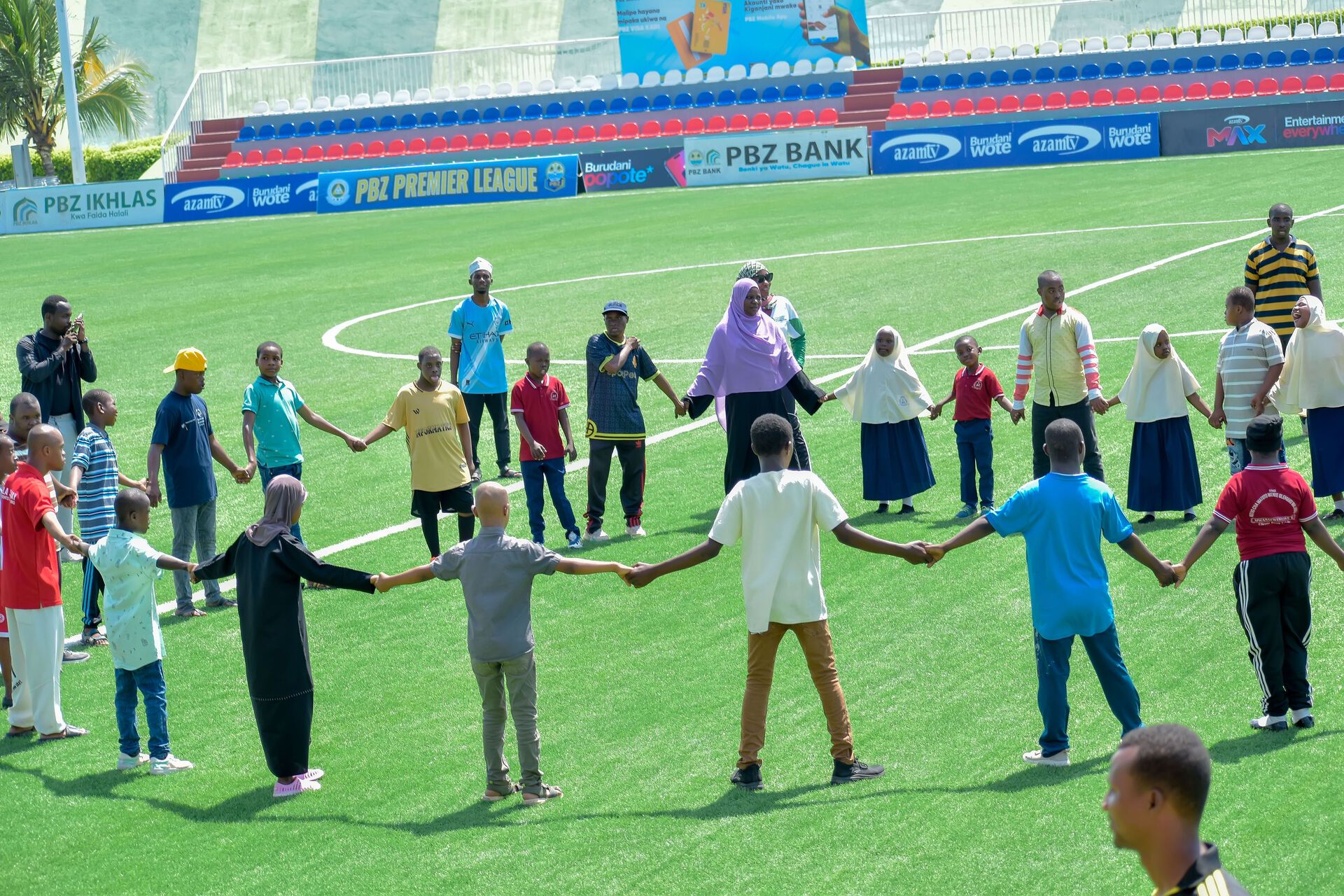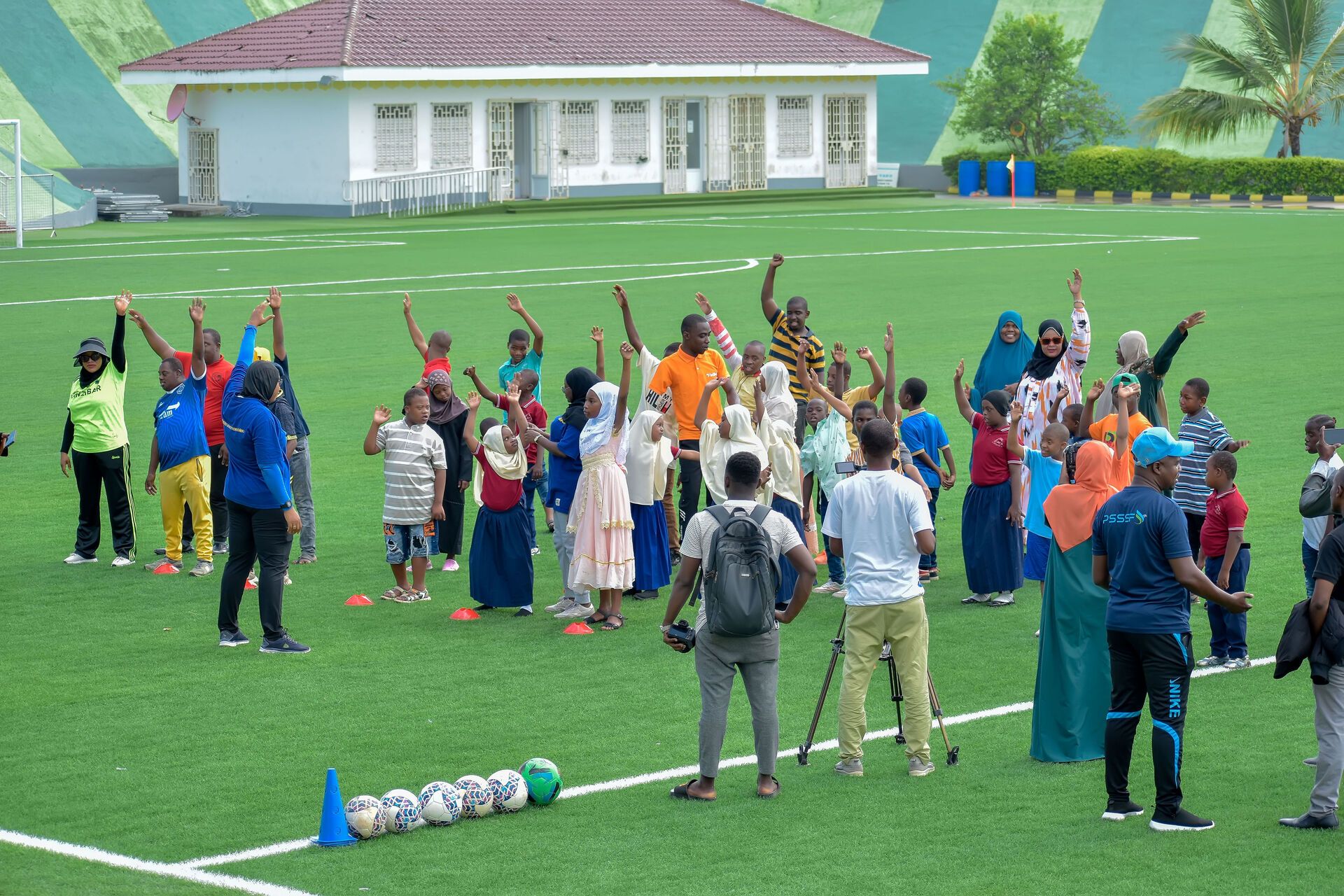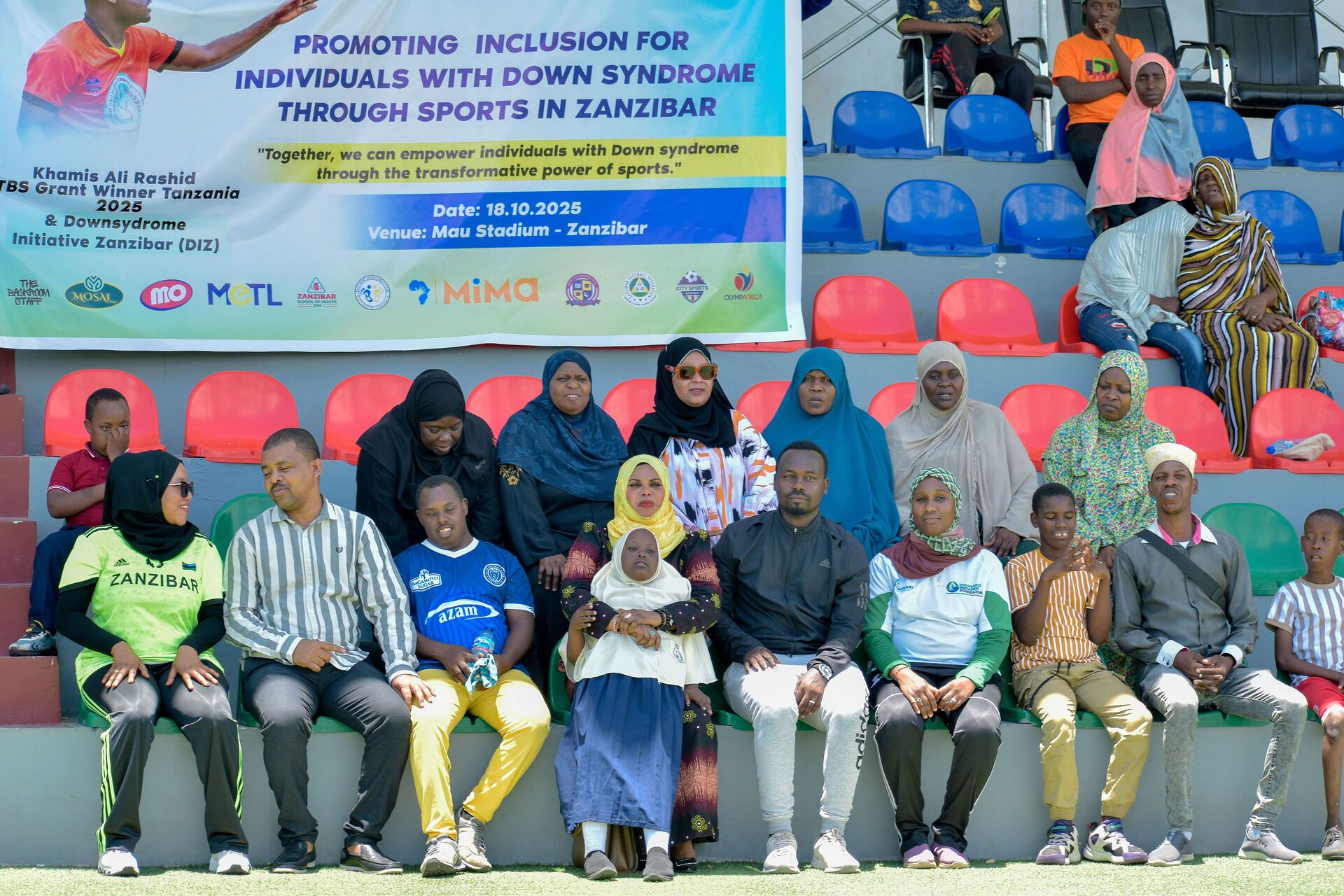- The Backroom Staff
- Posts
- The Backroom Staff - Project Coordinator: Khamis Ali Rashid
The Backroom Staff - Project Coordinator: Khamis Ali Rashid
Sport for development & football in Zanzibar
Project Coordinator: Khamis Ali Rashid
Sport for development & football in Zanzibar
Sport has the power to transform communities - not just by creating elite athletes, but by creating opportunities, building confidence, and giving people a sense of belonging. Few people embody this idea more clearly than Khamis Ali Rashid, whose work sits at the intersection of football, education, and social impact in Zanzibar.
Throughout his career, Khamis has held many roles - all aiming in the same direction - helping his community and the people who live there. In his day job at Good People International, he supports child nutrition programs across Zanzibar, while still finding time to coordinate charity matches, support youth through sports for development programs, and work in various roles at the Zanzibar Football Federation.
In this interview, Khamis shares his experiences in football and development, talks about the huge potential in Zanzibar and tells the story behind his latest big project: an event designed to raise awareness, build inclusion, and amplify the voices of people with Down Syndrome through sport.
NB: Khamis was one of the winners of The Backroom Staff's microgrant program. It was great to catch up and hear about the event he organized!
The interview has been condensed and lightly edited for grammar and clarity.
Read on thebackroomstaff.com

[ Background ]
I’m from Zanzibar.
Two islands - Unguja and Pemba - make up Zanzibar. It’s about two and a half hours by speedboat between them. I’m from Pemba and did my primary education there before doing my secondary education and my university degree in the Pwani and Dar es Salaam Regions.
Yes, I was always really interested in leadership, even at school before university. At university, I contended for the presidency of the students’ organization and ended up 5th in the vote, which was not too bad as there were very many candidates. After that, I was appointed by the president to be the Minister for Information and Foreign Affairs and I was also the chairperson of the gender club at the university.
Around then, I also started working very closely with the Minister of Sports and trying to engage in sports as well. So, yeah, I was deeply engaged in leadership and community work since I was in school.
After I completed my university degree in 2017, I came back to Zanzibar - I work and live in Unguja now - and started to engage myself in NGOs.
[ Were you also playing sports? ]
Yeah, I believe I was one of the most talented football players! I played a lot in university but mostly, my ‘career’ was over by then. I went to a football academy for two years during my secondary school and many of my friends who I played with there are now playing in the Tanzanian Premier League or the Zanzibar Premier League.
[ After university, you started working in NGOs, what kind of roles have you had? ]
Currently, I'm working at the Korean International NGO, Good People International here in Zanzibar. I’m a project officer and responsible for coordinating different projects - currently, I’m focused on a nutrition project where we support children in school and preschools in Kati District in Zanzibar.
I’m also part of the Zanzibar Football Federation (ZFF), where I’m working in the media and marketing committee. I’ve also been organizing charity matches for CSR projects in the community. In the last two years, my friends and I have been able to organize two big charity football matches in Zanzibar and, working with other government departments, have helped people with disabilities, people with Albinism and pregnant mothers and infants.
We’ve managed to get some very big players for our matches - the last one was at Amani Stadium here in Zanzibar and, for example, our national team captain in Tanzania, Mbwana Samatta - who played at Aston Villa and Genk - played in the match.
In the past, I’ve also worked at several different NGOs - including the Zanzibar Female Lawyers Association and the Zanzibar Widows Organization leading and coordinating leadership and education projects.
[ You’ve been involved in both football and community work - how do those overlap for you? ]
I studied sports development, which is about how sports are connected with community or social issues and development. I think it’s very important that these two meet because learning through sports has a lot of potential - you saw the videos (from the DS event) with the children and how happy they look interacting through sports.
I was later actually trained in sports development, specifically by a German organization called GIZ, and it has been very helpful and helped me find new ways to connect with a lot of people and connect sports and development in my work and projects.
[ Can you tell me about football in Zanzibar? How would you describe the football culture in Zanzibar? ]
I can say Zanzibar is one of the very gifted places when we speak of football talents.
The best player we have in Tanzania currently is Feisal Salum (Fei Toto). We also have a player called Ibrahim Hamad (Ibrahim Bacca), who is also playing in the Tanzanian Premier League and the Tanzania national team - I’m actually his brand manager! They are from Zanzibar.
Sports are a very, very big part of life in Zanzibar. Zanzibar is like Brazil, you’ll find each and every kid playing football in the streets - it’s amazing.
We have received a lot of players from abroad - for instance, Mamadou Sakho, who played at Liverpool and PSG, he came here and met with the president of the Revolutionary Government of Zanzibar. He saw all the talent and asked why we don’t have a serious and very productive football academy - and committed himself to building a great football academy here in Zanzibar.
My friend and I registered a youth football club, and we are champions of East Africa at under 16 level - we won the East Africa Cup, a tournament that was held in Moshi, around Kilimanjaro mountain.
These are some of the examples that show that we have football talent in Zanzibar. We have kids here who, I assure you, can play even in the Premier League in England. But despite the talent, we lack the funds and the foundation. We don’t have even one serious football academy and as a result, a lot of talent is dying here in Zanzibar.
We are also restricted because of the union - we only have one federation with membership in CAF and FIFA.
Zanzibar is like Brazil, you’ll find each and every kid playing football in the streets
[ Zanzibar was briefly in CAF in the 2010s, right? What is the reasoning for CAF and FIFA not to admit Zanzibar as a member? ]
It's because Zanzibar is part of Tanzania, and FIFA cannot give two memberships for one country.
To be honest, that's one of the most critical issues in sports in Zanzibar, and it's one of the things that we, as people from Zanzibar, believe that if, by any chance, we get back the membership of CAF and FIFA, then we are going to progress very quickly. We have a team that can even participate in the World Cup.
We have been playing friendly matches against teams that are playing in CAF and in FIFA, and we are showing a very serious level. We beat Uganda and Tanzania recently, for example.
I think it's a goal for each and every person from Zanzibar, that one day we get back FIFA and CAF membership.
[ Aren’t there some FIFA members like Gibraltar or the Faroe Islands or even the UK’s home nations (among many other exceptions) that aren’t recognized countries? ]
Yeah, and that's one of the reasons that we still believe that we can make it, because there are some other countries which are in the same situation, just like us, and they have representation of their countries in FIFA competition. It’s always been very difficult but I believe, one day, maybe yeah.
—^interviewer’s note: There are at least 26 FIFA members that aren’t recognized by the UN as independent countries. Despite this, both FIFA and CAF - which Zanzibar briefly joined in 2017 before CAF declared it an “error” and revoked membership four months later - insist they only admit associations from sovereign states. Zanzibar, of course, is officially part of Tanzania. While this might seem inconsistent given examples like Gibraltar, the Faroe Islands, or the four UK nations (England, Scotland, Wales, and Northern Ireland), those are treated by FIFA as historical exceptions - even in Gibraltar’s case, which was only approved in 2016 after years of legal battles. The British associations existed before FIFA was even founded, and their independence was built into football’s early governance. The Faroe Islands joined in 1988, before FIFA tightened its membership rules. For Zanzibar, joining today would almost certainly require (at least) Tanzania’s consent and a change to FIFA’s statutes.
[ What is the relationship between Zanzibar and Tanzania? ]
Zanzibar is part of the United Republic of Tanzania. There were two different countries but after the revolution in Zanzibar, we united with Tanganyika and created the United Republic of Tanzania.
Today, there are things that the union deals with and things we work on together and some things where we are not working together. So, Zanzibar is still quite separate politically and has its own president, our own flag, but, for example, we all have the same passport.
[ You recently ran a football event to celebrate and raise awareness for people with Down Syndrome - what inspired this event, and why was football the right medium to raise awareness? ]
Actually, this idea was contributed in large part by a friend in the UK called Coach H. He’s the coach of North London United, a team of children with Down Syndrome. I first saw them one or two years back and saw they were running a very nice program together with Arsenal.
I reached out to Coach H and talked to him a lot about Down Syndrome and how we can cooperate. I took a lot of advice from him, and he advised me on a lot of things - that was maybe a year and a half ago - and I told him, maybe one day, if we get the funds, I will do something for Down Syndrome.
That’s where the idea came from - and if you look at Zanzibar, not all, but most people are lacking awareness about people living with Down Syndrome and I thought it could be a great idea to have and publicize an event to create awareness. During the event, for example, they sang a lot of songs perfectly - I mean perfectly - and I think showed a lot of people that their brains are indeed very strong and they have a lot of potential.
So, when I saw the grant opportunity from TBS, I knew what to do! And, because I’m already involved in sports in Zanzibar, I think it was a bit easier because I have access to a lot of people and organizations dealing with sports around the country.
On the day, we celebrated about 100 people with Down Syndrome, who sang and danced and played football. I split it into two sessions and we had different speakers. I gave the introduction and talked a little about how events like this can raise awareness. We also had an expert on Down Syndrome here in Zanzibar, representatives from the Zanzibar School of Health and the Director of Youth Development in Zanzibar from the Ministry of Sports before our guest of honor, the permanent secretary from the Ministry of Sports. She spoke well and also committed, on behalf of the government, that the government will give free opportunities to the children living with Down Syndrome to go to government centers and study things like computer skills. This is an immediate positive outcome from the event.


most people are lacking awareness about people living with Down Syndrome and I thought it could be a great idea to have and publicize an event to create awareness
[ Were you happy with the reaction? ]
Yeah, starting from the participants, you can see from the pictures, from the videos, they are very happy, very happy, and I was very happy and proud. I think it was very interesting for the families. They also spoke with the media and were very thankful for the event and the opportunity, as well as for the things they might have learned from the speakers and were very supportive.
Also, the organizations that we invited were very supportive and are interested in making what happened on the pitch there, into something more sustainable.
[ Why is Down Syndrome, in particular, a cause that’s close to you? ]
There are a lot of causes I care a lot about, but I had to choose one! And, looking at the community in Zanzibar, it's like a forgotten group - there are people who are laughing at them. I’m bothered as one of the citizens here, I want to see everyone happy and respected - and I believed I could do something very positive.
as one of the citizens here, I want to see everyone happy and respected
[ You mentioned your background in sports for development - why are sports so important, or able, to create awareness around social topics? ]
When you learn through activities, it’s easier for many people to learn and retain the topics, rather than just sitting in class and trying to memorize the topics. I’ve been in class studying, and I’ve been on the pitch studying, and they are two different things!
When you move and do physical activities and learn at the same time, your brain is more active. I think it’s a revolutionary idea to engage sports and education, and in my opinion, that’s where the world is going.

Follow Khamis on LinkedIn and let him know you enjoyed the interview!
Have comments, questions or want to have your story featured on The Backroom Staff? send us a message or simply reply to this newsletter, we'll read it!
Read more interviews on The Backroom Staff 🙂